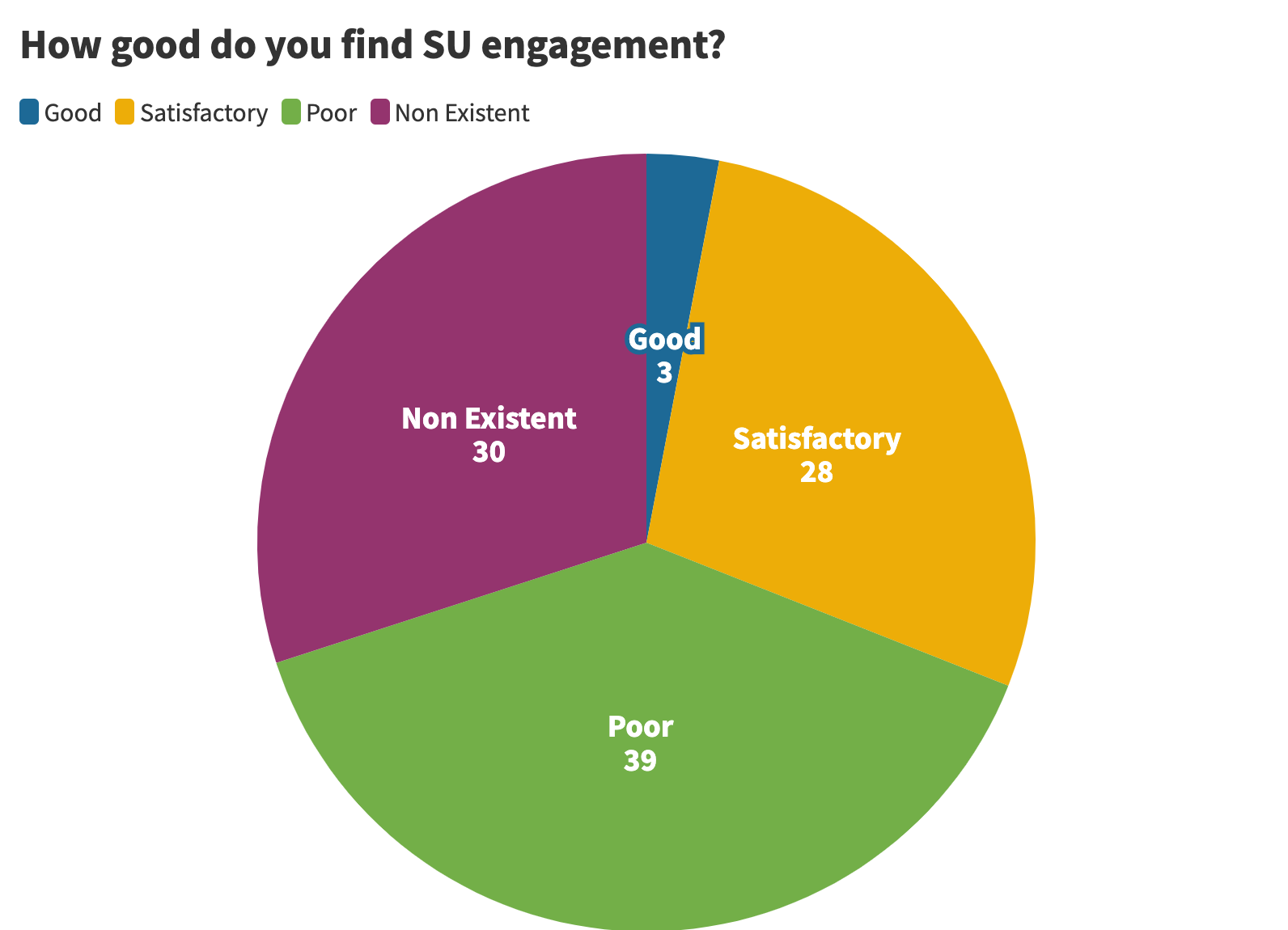Student voter turnout in the Oxford University Student Union elections last week was just 10%, despite numerous pledges by past and present sabbatical officers to “improve SU engagement”. Similar to previous years, this figure amounts to just 2762 students out of a total student body of 26,000 at Oxford University. So what does the SU actually do for the average Oxford student, and why is there such a significant failure to engage with it?
In a series of polls set up by Cherwell to gauge SU engagement, 69% of the 122 students who responded felt that the SU’s engagement with the student body was either poor or non-existent. A mere 3% voted that it was good, and 28% that it was passable.

With six sabbatical officers, each paid £25,000 a year, pay costs the SU about £150,000.
At present, SU’s primary methods of communication with the student body as a whole are through weekly emails, social media, and four council meetings held each term. However, of the students who engaged with Chewell’s polls, 52% said they immediately delete SU emails. While 45% said they read SU emails occasionally, only 3% of voters said that they read SU news in detail. In addition to this, of 157 voters, 138 claim never to have been to a student council meeting.
One student who participated in the survey told Cherwell that they find the SU “completely pointless, as JCRs fulfil all the functions an SU would in a unitary university.” They raise the question: Is a student union necessary in a collegiate university?
When asked whether people found the SU important in a collegiate University almost 10% of those polled claimed to not know what the Student Union was, and were therefore unable to answer the question. 51% voted that they didn’t, and just 15% agreed that the SU was important in a collegiate university.
Cherwell also polled college JCR presidents, receiving responses from the presidents of Balliol, Brasenose, Exeter, Jesus, Keble, Merton, Oriel, St Catz, St John’s and St Peter’s. 60% of the JCR Presidents who responded to the survey felt they could “definitely” do their duties without SU input. The other 40% voted it was ‘likely’ they could.
One JCR president said, “systemically the SU is pretty useless when it comes to fighting colleges, or pushing the central university to control the colleges more (which in my own opinion is why we have so many of the systemic issues that we have in Oxford).”
Meanwhile, another JCR President told Cherwell: “I’d love for there to be more SU engagement, there’s potential for it to be a really strong student voice, but right now it’s so detached from JCRs that I don’t think it’s representative or useful for most students.”
80% of the JCR President respondents said that the SU engagement with their JCR is ‘poor’.
One JCR president told Cherwell, “The Oxford SU clearly has a massive engagement issue… If all the SU can provide is occasional workshops for JCR Committee members, it’s hard to see how this benefits the whole of the Oxford student body, and justifies paying the sabbs wages.”
JCR presidents, when asked what support they received from the SU, mentioned rent negotiation training, college comparisons, and the option to access more general policy and procedure advice. Yet some JCR presidents told Cherwell that even the rent negotiation workshops were poorly organized. One claimed they were given only 2 hours notice before the workshop took place, characterising this as “negligent organisation”. Some colleges missed the workshop. Another JCR President told Cherwell the rent negotiation training came “a little late” for them as they had already negotiated with college and come to an agreement just as the help had been advertised.
60% of JCR presidents who responded voted that they did not find SU services and communications efficient. The SU writes on its website that they “work closely with JCRs and MCRs across the colleges with lobbying support, training, wellbeing products, and more,” with eight student-led campaigns “fighting to improve [the] student experience and build communities along the way.”
However, when asked how supported they felt by the SU, 98% of the students surveyed by Cherwell said they felt unsupported. The reaining 2% felt somewhat supported.
Despite student dissatisfaction with current SU-JCR relations, 70% of the JCR Presidents who responded voted that they would still prefer to ‘support initiatives for greater SU engagement’ as opposed to the options of disaffiliating the JCR from the SU, or keeping the relationship as is.
Responses among the JCR Presidents about what the SU could do to improve engagement included ideas about improving convenience of the student council; in its current form, it is “too long and feels too ineffective to motivate people to attend.”
Further thoughts focused on “making their presence better known with students,” with one President saying there needs to be “more outreach and visibility on what the SU actually is.” They suggested hosting an introduction to the SU in freshers’ week. However, they added “the JCR communications channel selectively, by picking projects for which engagement is essential. This gives the SU a means of getting to students more efficiently, but only works if it is not overloaded.”
One JCR president feels the SU would benefit from having “a more unified goal each year” as, whilst they recognize that the sabbs and SU are working hard, they feel they may be doing “too many things,” so “it feels like none of them are truly meaningful.” This “creates an environment where students are unsure of what they even do, which drives engagement down.” Another mentions the idea of “more involvement towards common goals that are set out as a whole” to improve SU engagement, and “for them to be more proactive in fighting colleges than the central university.”
When asked for comment on how they could improve engagement, the Sabbatical Officers told Cherwell they would “encourage any student to come along and see first-hand the work that we as a team are doing.” During these student council meetings “student members can come along and ask questions, pass motions and hold sabbatical officers to account.”



